Atrial Septal Defect (ASD) Transcatheter repair is a treatment for closing a hole in the atrial septum. The atrial septum is a wall that divides the heart's right and left upper chambers (atria). An atrial septal defect, or ASD, is a hole in the heart. Blood can flow irregularly from the left atrium into the right atrium if this abnormality exists. As a result, the heart pumps more blood to the lungs. If left untreated for a long time, the additional blood can damage the blood vessels in the lungs. The right ventricle (pumping chamber on the right side of the heart) can also expand. As a result, it needs to pump more forcefully than necessary to send blood to the lungs. ASD transcatheter repair closes the hole with a long, flexible tube (a catheter) and a tiny device.
Malaysia is known as one of the best healthcare destinations in the world, with world-class facilities, cutting-edge technology, and professionals with a solid educational and training basis. The cardiac sciences treatments performed in Malaysian hospitals are done with great elegance and technological expertise. Procedures such as ASD Repair fall under this category.
Gleneagles Medini, KPJ Ampang Puteri Specialist Hospital, and Parkway Pantai Hospital are some of the good hospitals in Malaysia that have successfully done ASD Repair Surgery.
ASD Repair Surgery cost in Malaysia is between US$13000-US$15000 whereas in Singapore the cost is about US$ 20,000 and the cost of this procedure in South Korea is US$ 18000- US$20000.
Treatment cost
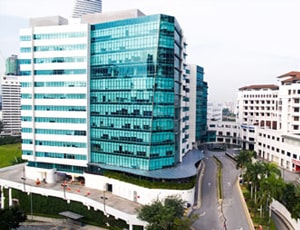
Parkway Pantai located in Kuala Lumpur, Malaysia is accredited by JCI. Also listed below are some of the most prominent infrastructural details:

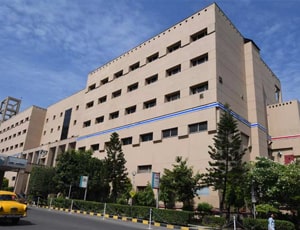
Types of Atrial Septal Defect (ASD) Repair in Apollo Multispecialty Hospitals and its associated cost
| Treatment Option | Approximate Cost Range (USD) | Approximate Cost Range (INR) |
|---|---|---|
| ASD Repair (Overall) | 5744 - 13347 | 452566 - 1131354 |
| Surgical Repair | 5613 - 9984 | 458336 - 833754 |
| Transcatheter ASD Closure | 6613 - 11299 | 561687 - 941783 |
| Robotic-assisted ASD Repair | 7771 - 13360 | 634885 - 1082676 |
DOCTORS IN 13 SPECIALITIES
FACILITIES & AMENITIES
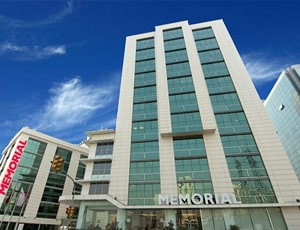
Types of Atrial Septal Defect (ASD) Repair in Memorial Atasehir Hospital and its associated cost
| Treatment Option | Approximate Cost Range (USD) | Approximate Cost Range (TRY) |
|---|---|---|
| ASD Repair (Overall) | 9186 - 17112 | 266260 - 498804 |
| Surgical Repair | 8889 - 14917 | 276045 - 447913 |
| Transcatheter ASD Closure | 10165 - 15748 | 305285 - 467554 |
| Robotic-assisted ASD Repair | 11484 - 16714 | 344531 - 513477 |
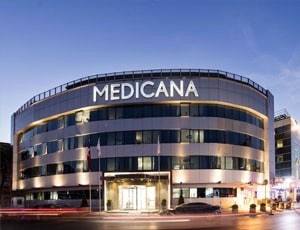
Types of Atrial Septal Defect (ASD) Repair in Medicana Bahcelievler Hospital and its associated cost
| Treatment Option | Approximate Cost Range (USD) | Approximate Cost Range (TRY) |
|---|---|---|
| ASD Repair (Overall) | 8952 - 17208 | 275525 - 502700 |
| Surgical Repair | 8910 - 14791 | 265998 - 436082 |
| Transcatheter ASD Closure | 10243 - 15574 | 303626 - 474458 |
| Robotic-assisted ASD Repair | 11335 - 16899 | 334348 - 519616 |
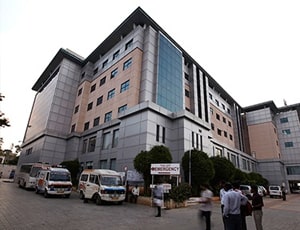
Types of Atrial Septal Defect (ASD) Repair in BGS Gleneagles Global Hospitals and its associated cost
| Treatment Option | Approximate Cost Range (USD) | Approximate Cost Range (INR) |
|---|---|---|
| ASD Repair (Overall) | 5512 - 13329 | 467210 - 1112927 |
| Surgical Repair | 5501 - 10213 | 461052 - 829884 |
| Transcatheter ASD Closure | 6678 - 11017 | 544884 - 926341 |
| Robotic-assisted ASD Repair | 7832 - 13718 | 643343 - 1097210 |
DOCTORS IN 14 SPECIALITIES
FACILITIES & AMENITIES
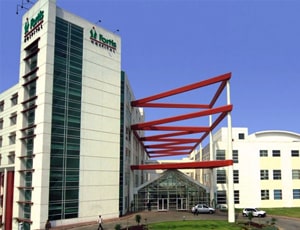
Types of Atrial Septal Defect (ASD) Repair in Fortis Hospital and its associated cost
| Treatment Option | Approximate Cost Range (USD) | Approximate Cost Range (INR) |
|---|---|---|
| ASD Repair (Overall) | 5078 - 12152 | 414204 - 997021 |
| Surgical Repair | 5072 - 9094 | 418016 - 746674 |
| Transcatheter ASD Closure | 6075 - 10136 | 498754 - 836080 |
| Robotic-assisted ASD Repair | 7086 - 12163 | 584783 - 999771 |
DOCTORS IN 12 SPECIALITIES
FACILITIES & AMENITIES
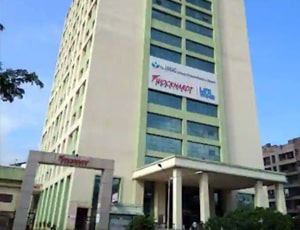
Types of Atrial Septal Defect (ASD) Repair in Wockhardt Hospital, Umrao and its associated cost
| Treatment Option | Approximate Cost Range (USD) | Approximate Cost Range (INR) |
|---|---|---|
| ASD Repair (Overall) | 5072 - 12196 | 418199 - 995810 |
| Surgical Repair | 5074 - 9090 | 416284 - 748860 |
| Transcatheter ASD Closure | 6116 - 10172 | 500448 - 830035 |
| Robotic-assisted ASD Repair | 7137 - 12151 | 583821 - 995688 |
DOCTORS IN 13 SPECIALITIES
FACILITIES & AMENITIES
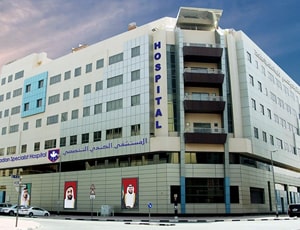
Types of Atrial Septal Defect (ASD) Repair in Canadian Specialist Hospital and its associated cost
| Treatment Option | Approximate Cost Range (USD) | Approximate Cost Range (AED) |
|---|---|---|
| ASD Repair (Overall) | 11493 - 21534 | 40990 - 79547 |
| Surgical Repair | 11340 - 16916 | 41470 - 62674 |
| Transcatheter ASD Closure | 12527 - 19109 | 45415 - 70383 |
| Robotic-assisted ASD Repair | 13921 - 21567 | 52559 - 80099 |

Types of Atrial Septal Defect (ASD) Repair in Indraprastha Apollo Hospital and its associated cost
| Treatment Option | Approximate Cost Range (USD) | Approximate Cost Range (INR) |
|---|---|---|
| ASD Repair (Overall) | 5564 - 13416 | 467768 - 1126690 |
| Surgical Repair | 5534 - 10100 | 463611 - 824911 |
| Transcatheter ASD Closure | 6757 - 11447 | 545960 - 903810 |
| Robotic-assisted ASD Repair | 7964 - 13414 | 653658 - 1094953 |
DOCTORS IN 14 SPECIALITIES
FACILITIES & AMENITIES
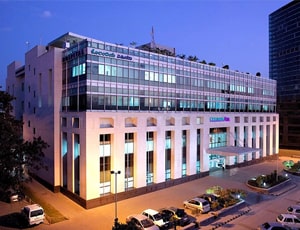
Types of Atrial Septal Defect (ASD) Repair in Manipal Hospital, Yeshwantpur and its associated cost
| Treatment Option | Approximate Cost Range (USD) | Approximate Cost Range (INR) |
|---|---|---|
| ASD Repair (Overall) | 5730 - 13353 | 457418 - 1088021 |
| Surgical Repair | 5722 - 10231 | 466994 - 826618 |
| Transcatheter ASD Closure | 6745 - 11038 | 554156 - 924274 |
| Robotic-assisted ASD Repair | 7935 - 13404 | 633332 - 1119789 |
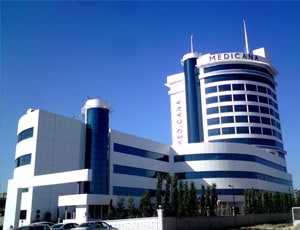
Types of Atrial Septal Defect (ASD) Repair in Medicana Konya Hospital and its associated cost
| Treatment Option | Approximate Cost Range (USD) | Approximate Cost Range (TRY) |
|---|---|---|
| ASD Repair (Overall) | 8857 - 16893 | 272780 - 518799 |
| Surgical Repair | 9022 - 14764 | 265776 - 449438 |
| Transcatheter ASD Closure | 10050 - 15993 | 309080 - 473767 |
| Robotic-assisted ASD Repair | 11213 - 17080 | 331697 - 499668 |
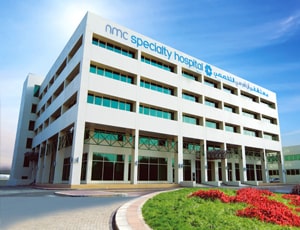
Types of Atrial Septal Defect (ASD) Repair in NMC Specialty Hospital - Al Ain and its associated cost
| Treatment Option | Approximate Cost Range (USD) | Approximate Cost Range (AED) |
|---|---|---|
| ASD Repair (Overall) | 11379 - 21041 | 42535 - 76811 |
| Surgical Repair | 11606 - 16995 | 41283 - 61319 |
| Transcatheter ASD Closure | 12248 - 19117 | 46117 - 69162 |
| Robotic-assisted ASD Repair | 14169 - 21727 | 51136 - 79357 |
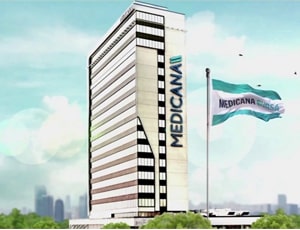
Types of Atrial Septal Defect (ASD) Repair in Medicana Bursa Hospital and its associated cost
| Treatment Option | Approximate Cost Range (USD) | Approximate Cost Range (TRY) |
|---|---|---|
| ASD Repair (Overall) | 9016 - 16908 | 271640 - 503863 |
| Surgical Repair | 8897 - 14700 | 274209 - 432180 |
| Transcatheter ASD Closure | 10157 - 15975 | 305258 - 473094 |
| Robotic-assisted ASD Repair | 11493 - 16538 | 332098 - 509606 |
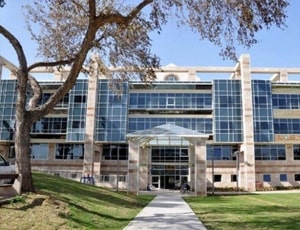
Kaplan Medical Centre located in Rehovot, Israel is accredited by JCI. Also listed below are some of the most prominent infrastructural details:
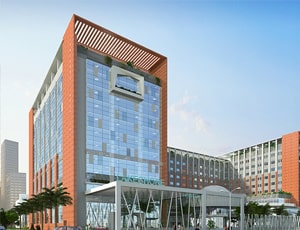
Types of Atrial Septal Defect (ASD) Repair in VPS Lakeshore Hospital and its associated cost
| Treatment Option | Approximate Cost Range (USD) | Approximate Cost Range (INR) |
|---|---|---|
| ASD Repair (Overall) | 5050 - 12148 | 416784 - 999025 |
| Surgical Repair | 5066 - 9138 | 414696 - 746022 |
| Transcatheter ASD Closure | 6116 - 10126 | 499003 - 831176 |
| Robotic-assisted ASD Repair | 7103 - 12230 | 580039 - 995086 |
DOCTORS IN 13 SPECIALITIES
FACILITIES & AMENITIES
Atrial Septal Defect is a congenital heart defect in which there is a hole in the wall (septum) between the upper chambers of the heart (atria). This hole allows blood to flow between the atria, which leads to increased blood flow to the lungs. While small ASDs may not cause any significant concerns, whereas larger ones may require medical attention, such as surgical repair, to prevent complications.
The main reason for atrial septal defects remains elusive, manifesting as an alteration in the heart's structure during fetal development. The intricate process of the baby's heart formation is an essential stage for the emergence of this condition.
ASDs may arise due to the following factors, including
Atrial septal defects (ASDs) may be better understood by considering the normal functioning of the heart, which has four chambers – two atria and two ventricles. The right side of the heart directs blood to the lungs for oxygenation, while the left side pumps oxygenated blood throughout the body via the aorta. A significant ASD can lead to an excess flow of blood to the lungs, straining the right side of the heart. If left untreated, this can result in the enlargement and weakening of the right heart chamber and an elevation in pulmonary artery pressure, Causing pulmonary hypertension.
There are different types of ASDs classified based on the Location and the size of the hole, these include:
Atrial septal defect (ASD) repair is used to close a hole in the septum, There are different methods for repairing ASD, and the choice of procedure depends on the size, the position of the defect, and the patient's general health the determining factors in choosing the appropriate treatment.
Here are the common ways of treatment:
Post-surgery, patients usually have a short hospital stay, with transcatheter closure requiring 1-2 days and open-heart surgery lasting 3-7 days, sometimes involving ICU transfer to continue monitoring. A comprehensive recovery plan involves regular follow-up appointments, dietary adjustments, wound care, and emotional support. Additionally, effective pain management, adherence to activity restrictions, and a gradual return to normal activities are crucial components of the recovery process.
Ask your healthcare adviser for the best multiple options and choose the one that meets your expectations
Atrial Septal Defect (ASD) Repair cost in Malaysia varies from one hospital to the other. Some of the best hospitals for Atrial Septal Defect (ASD) Repair offer a comprehensive package that covers the end-to-end expenses related to investigations and treatment of the patient. The Atrial Septal Defect (ASD) Repair procedure in Malaysia includes the fees of the surgeon, hospitalization and anesthesia as well. Post-surgical complications, new findings and delayed recovery may have an impact on the total Atrial Septal Defect (ASD) Repair cost in Malaysia.
Atrial Septal Defect (ASD) Repair in Malaysia is offered by multiple hospitals across the country. Some of the best hospitals for Atrial Septal Defect (ASD) Repair in Malaysia include the following:
After Atrial Septal Defect (ASD) Repair in Malaysia, the patient is supposed to stay in guest house for another 20 days. This time frame is important to ensure that the surgery was successful and the patient is fit to fly back.
There are certain additional cost that the patient has to pay apart from the Atrial Septal Defect (ASD) Repair cost. The extra charges may start from USD 50 per person.
Atrial Septal Defect (ASD) Repair in Malaysia is offered in almost all metropolitan cities, including the following:
The average duration of stay at the hospital after Atrial Septal Defect (ASD) Repair is about 5 days for proper care and monitoring. The doctors team review the patient's recovery during this time with the help of blood tests and imaging scans. Once they feel that everything is on track, the patient is discharged.
There are more than 1 hospitals that offer Atrial Septal Defect (ASD) Repair in Malaysia. The above listed hospitals are approved to perform the surgery and have proper infrastructure to handle Atrial Septal Defect (ASD) Repair patients. Apart from good services, the hospitals are known to follow all standard and legal guidelines as dictated by the local medical affairs body or organization.
Some of the top doctors for Atrial Septal Defect (ASD) Repair in Malaysia are: